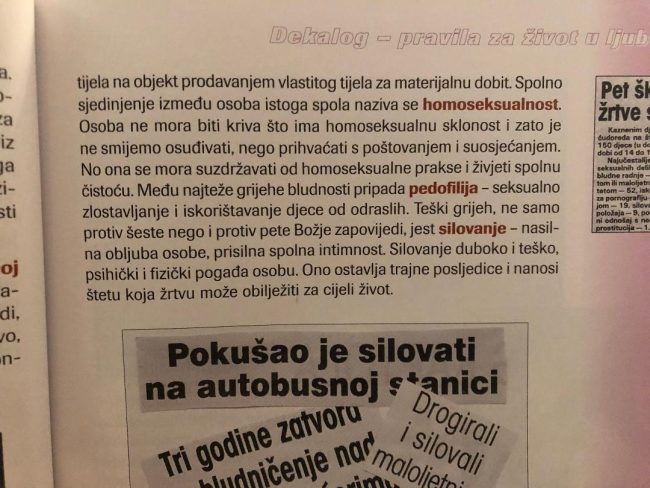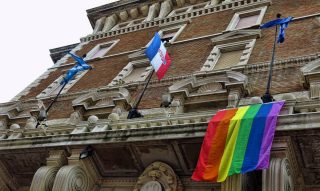School is one of the key environments for socialisation where children and youngsters develop their competencies and establish relationships with peers and adults. In order enable that; it is crucial that schools are spaces that are
safe, timulating and supportive. This is especially a challenge in context of young lesbians, gays, bisexuals, transgender and intersex people who face stigma, discrimination and marginalization and often various forms of violence (IGLYO, 2018). The results of the survey conducted by the EU Agency for Fundamental Rights in 2014 show that in Croatia, by the age of 18, two thirds of LGBTI people hid their orientation at school and 69% of them experienced negative comments.
With a goal of ensuring inclusive education, in 2018 IGLYO has, in partnership with civil society organizations and education professionals, conducted a study which showed that less than half of Member States’ national or regional action plans explicitly prevent and address homo/bi/transphobic violence (LGBTQI Inclusive Education Report). The European Union, the Council of Europe and the United Nations recognise the worrying presence of discrimination and violence against LGBTI youth in schools. Therefore, they have issued directives and recommendations aimed at combating homo/bi/transphobia in education and protecting children and young people in school environment. These international documents recognise the importance of a comprehensive approach to this problem. Such approach includes the development of national and school policies, curricula and educational materials, trainings of educators, support for young LGBTI people, and implementation of educational and information campaigns at the national level (Guidelines for combating homophobia, transphobia and peer violence based on sexual orientation and gender identity in schools, LORI, 2016).
Croatia also recognises the importance of human rights protection and provides legislative protection against various forms of discrimination, while there is also an effort to promote human rights through school curricula. The National Framework Curriculum (2010) emphasizes the importance of human rights discourse, yet only in the form of cross-curricular topics, which due to the significant amount of compulsory teaching content fail to be implemented at satisfactory levels. The report Human Rights in Croatia: Overview of 2019 (Human Rights House Zagreb) points out that a new curriculum for the cross-curricular topic Health “does not mention gender stereotypes, gender equality, LGBTIQ topics, issues of respect for diversity and tolerance of sexual minorities or promotion of positive attitudes towards sexuality”. Zagreb Pride (2018) in the Report on the Human Rights of LGBTIQ Persons in Croatia 2014-2017 warns that “despite the legal prohibition of discrimination against LGBTIQ persons, and given the non-implementation of plans aimed at reducing homophobia, biphobia and transphobia in the education system, basic knowledge and attitudes towards LGBTIQ people are formed primarily within religious education, which, unlike health education and civic education, is systematically implemented in public schools ”. The inappropriate and humiliating content where same-sex orientation is mentioned right next to rape and pedophilia is precisely visible in the religious education textbook Together in Love – Textbook for Catholic religious education of the seventh grade of primary school.

Research at national level (LORI, 2007.; Bagić i Gvozdanić, 2015.; Zagreb Pride, 2013.) affirms that homo/bi/transphobia and violence against LGBTI persons are among key issues in the Croatian society, which further indicates the necessity of adequate inclusion of human rights content and LGBTIQ topics in school curricula. The research by Kuliš and Petrović (2018) examined the connection between certain educational factors and attitudes of high school students about people of the same-sex orientation. The results of this research have indicated that 50% of high school students attending final grade consider same-sex orientation to be a form of disorder or disease.
It is undeniable that various forms of homo/bi/transphobia leave immediate and long-term consequences on the psychosocial health of LGBTI youth. LGBTI persons are victims of emotional, verbal and physical violence and also live in fear of possible attacks or rejection. In facing these problems, LGBTI youngsters deal with depression, anxiety, fears and feelings of anger – while generally they do not seek help from teachers because of the fear of further condemnation, and their particular vulnerability is reflected in the fact that they often do not have support of their families.
If we consider all of the above, can we really claim that the Croatian educational system educates young persons to respect human rights and freedoms of all people equally? It would also be worth considering whether Croatian schools are really places of safety and support for all students.
LET’S MAKE EDUCATION SAFE AND INCLUSIVE!
The text was created as part of the #LORIIDAHOBIT2020 campaign with the aim of informing the public about the position of LGBTI youth in the educational system in Croatia and the importance of education on LGBTIQ topics in schools. The campaign includes a series of video testimonies of LGBTI young people who talk about their experiences during school and informative articles on the issues of homophobia, biphobia and transphobia in education. The campaign is created by second-year graduate students of pedagogy at FFRi, as part of their professional practice, Antonela Pribanić and Tea Staničić, in collaboration with mentors from the LORI association.
